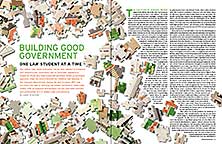At lunch at a restaurant near his Central Park West apartment, Richard Epstein, Laurence A. Tisch Professor of Law, is explaining his view of the regulatory state. He emphasizes that, his libertarian stance notwithstanding, he is not against all regulation. It’s just that, he says, “most of the modern regulatory state stuff is wrong.” Regulations, he says, are poorly designed, excessive, incoherent, irresponsible, perverted. All those adjectives arrive before the meal does.
Visiting each fall since 2005 to teach a variety of courses, and joining the faculty full-time this year, Epstein is an unwavering, conservative scholar whose deeply reasoned and blunt views on regulation clash with those of most other faculty members, thereby enriching the discourse. “Granted, he’s a foe of the administrative state, but he’s the most important thinker in opposition to the regulatory state we have in the country,” says Professor Rachel Barkow.
 Epstein will teach a course in Spring 2011 (along with Bruce Kuhlik, general counsel of Merck) on one of the bulwarks of the regulatory state: the Food and Drug Administration. Describing the course, Epstein lays out a conventional-seeming syllabus—examining how products are approved, clinical trials, recalls—until he adds, “What’s right and wrong about the FDA.” There’s no doubt which side Epstein takes. But just in case, Epstein offers: “I’d blow them up.” He then methodically dissects the agency and its failings, which he says range from “permit-itis”—too many permits required—to “ossified” scientists and bureaucrats who have neither the capacity nor expertise to regulate drug-making. Of the FDA’s propensity to deny or drag out drug approvals, he says, gesticulating, “It’s like carnage as far as I’m concerned.”
Epstein will teach a course in Spring 2011 (along with Bruce Kuhlik, general counsel of Merck) on one of the bulwarks of the regulatory state: the Food and Drug Administration. Describing the course, Epstein lays out a conventional-seeming syllabus—examining how products are approved, clinical trials, recalls—until he adds, “What’s right and wrong about the FDA.” There’s no doubt which side Epstein takes. But just in case, Epstein offers: “I’d blow them up.” He then methodically dissects the agency and its failings, which he says range from “permit-itis”—too many permits required—to “ossified” scientists and bureaucrats who have neither the capacity nor expertise to regulate drug-making. Of the FDA’s propensity to deny or drag out drug approvals, he says, gesticulating, “It’s like carnage as far as I’m concerned.”
Epstein’s best-known work came in 1985 with Takings: Private Property and the Power of Eminent Domain. His insistence that government must respect and compensate private property rights is a springboard to his view of regulation.
The professor’s underlying principle is that any regulation must leave all affected people better off than with no rule. More specifically, Epstein says regulations ought to come in later rather than sooner. So if you’re planning on putting up a manufacturing plant next to a house, you should not force the builder to go through an exhaustive permission process first. Under his preferred regime, “I can’t stop you from putting in a foundation,” he says. “But once pollution comes in, I can shut you down.” The beauty of this, he says, is that the builder of the plant understands that threat—and won’t want to construct here in the first place. “What on earth is there to commend the current system?” he asks, sounding exasperated. Although Epstein takes issue with just about everything emanating from the Obama administration, at least the president’s policies are giving Epstein plenty of material to work with — and future courses to teach.
A sampling of Richard Epstein’s positions on current regulatory issues:
Health-care overhaul: “It’s going to craterize the system,” he says. “There’s nothing in this bill that controls costs.”
Financial regulation: “I have no confidence this federal government will come up with a system of regulation that will do the job,” he says. Rather, Epstein would like to see a decent bankruptcy system to handle the large cases.
Consumer protection agency: “It will end up hurting the very people whom they purport to help,” he says, referring to credit card and other loan restrictions.
Global warming: Insisting that too many uncertainties surround the theory to commit billions of dollars to decrease carbon levels, he would instead focus on reducing methane.
